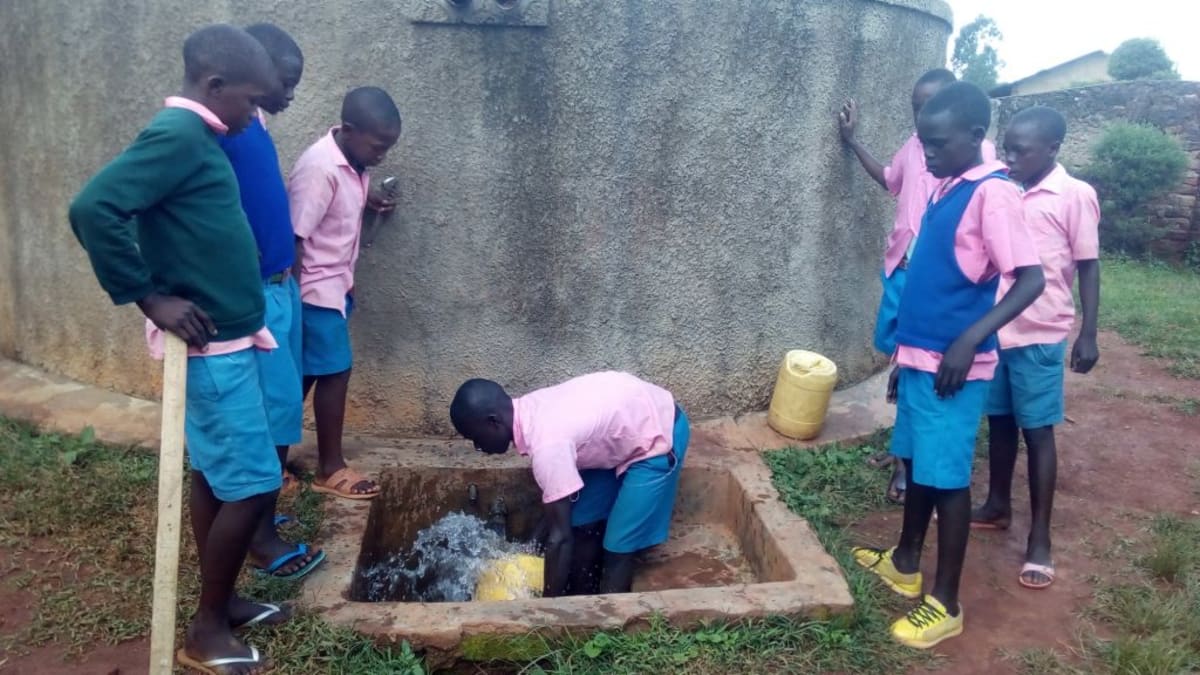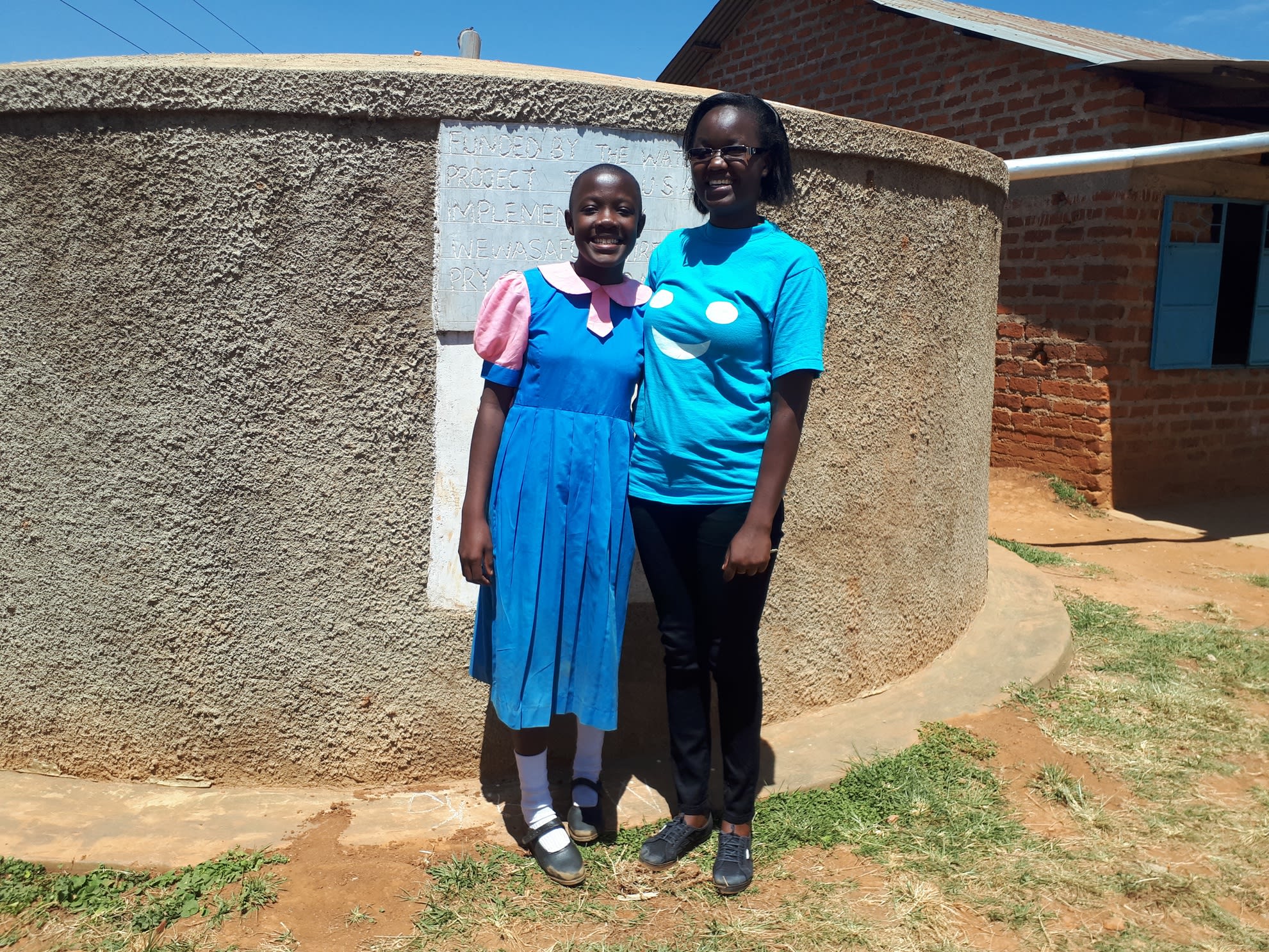This project is a part of our shared program with Western Water And Sanitation Forum (WEWASAFO). Our team is pleased to directly share the below report (edited for clarity, as needed).
Welcome to the School
Entering Virembe Village, it would be easy to wonder why a donation should be made to such a neighborhood; there are considerable amounts of permanent houses and comfy vehicles.
Entering home after home, it seemed like our first visit to verify the school's need would be a waste of time. But we carried on with the mission to reach the institution whose head had tirelessly called office staff begging for help. This all turned around as we drew near the school by an old gate at the corner. Vehicles and motorbikes screeching by, mixing with people's groanings and wailings from a motorcade escorting a corpse to Imusudzu Village. We were almost mowed down by the hustle and bustle of students rushing outside the school gate to have a glimpse of the procession; they stared with sad faces to show they were in the same spirit as the mourners. Twenty minutes passed as the motorcade finally disappeared.
Inside the congested classrooms, we were welcomed by a dusty, choking atmosphere filled with the smell of human sweat. The lunch break bell had just started to ring, so the children rushed home in order to return by 2PM. Afternoon classes would then resume, only to be interrupted after forty minutes as pupils leave to fetch water from Virembe Spring.
They get back to school breathing heavily, tired after climbing the hill from the spring. This all makes it very hard to concentrate in class. A break for games is held from 4-5PM when after everyone except the watchman returns home.
They report to school the following day at 6:40AM to sweep all rooms and clean the ground in front of every classroom, collecting all rubbish before class starts at 7AM.
A school feeding program was started in 2014, but failed because parents could hardly bring maize and beans for preparing lunch. Teachers now only select a few of the poorest pupils to give food.
The school was started in 1946 as a community initiative under the able leadership of Pentecostal Assemblies of God Church. Virembe Primary School has persisted amidst all odds to become one of the best public primary schools for academic performance at all levels. It currently serves 565 students and employs 23 teachers.
(Editor's Note: While this many people may have access on any given day, realistically a single water source can only support a population of 350-500 people. This community would be a good candidate for a second project in the future so adequate water is available. To learn more, click here.)
More About the Area
We later learned the reason for all of the nice homes in the area, explained by the senior teacher:
"Many foreigners, especially from other tribes like Kikuyu and Luos have invaded Virembe, buying pieces of land and building nice houses around the school. Most of these foreigners are business people or individuals employed in prosperous schools and government offices, especially at Hamisi, Kaimosi, Shamakhokho, and Serem centers. Children of these well-off families go to good private schools like Shalom, Serve and Royal Academies while it is those from impecunious indigenous homes that go to Virembe Primary School. Those well-to-do families have tea plantations where some guardians of Virembe offer casual labor to earn 150 shillings per day, which can hardly fend for a family. Abject poverty is the exact definition of these people, who engage in casual work to earn a living. Most original men in this area are alcoholics, leaving their family responsibilities to either their wives or their mothers.
Pupils lack father figures in their lives and most of the times become too unruly to be controlled by their mothers - especially boys - because Tiriki culture tends to belittle women.
Almost all pupils here were born out of wedlock with their biological fathers rejecting them and their biological mothers leave the children with their old, poor grandparents as they go to work as housemaids in Nairobi or get married to husbands who cannot accept other men’s children as their own."
Many times, teachers have sacrificed their money to buy school uniforms, learning stationery and food for the very poor children just to keep them in school.
Proximity to the Shamakhokho–Serem main tarmac road that passes by the gate is one of the greatest challenges to this institution: During lunch break, some students are seen playing football as they cross the road, which puts them at risk of being crushed or hit by running vehicles. The nursery children must be brought by their guardians and helped to cross the busy road every morning. When returning home, the Early Childhood Education (ECDE) teachers must hold children's hands one by one until they all cross the road to head home by themselves.
Thursdays are the worst of all days for this institution. Friends and family members hire vehicles and motorbikes to carry mourners to mortuaries where the bodies of their dear ones are preserved before transportation to their own homes for burial. Relatives with other mourners wail, shout in anger, scream and cry, as well as sing dirges at the top of their voices on their way to the morgue and also as they transport the remains of the dead back home from the mortuaries. The funeral noises have always disrupted classes.
Alcoholism has become a cancer in this village. Pupils are affected by it both directly and indirectly. Some women have ventured into the business of brewing and selling local alcohol. One such woman is Getrude - who sells alcohol out of her home just next to the school fence. She is arrogant when spoken to, and fears nothing since she is known allover, including by the government representatives and police who she bribes to continue her illegal business. "We really had a problem last year when our standard eight boys used to take alcohol from that den and then misbehave in school," Teacher Shibira shared. "This is the worst environment to raise a child, but we have no ability to remove them from this environment. The best we can do is give counseling to our children," she continued. These pupils see a father figure in their male teachers.
Water Situation
A well was installed years ago, but it only served the school for a short time. Whether it rains or not, the well is always dry. The school thus purchased a 1000-liter plastic tank to help them alleviate the water shortage, but it is much too small to serve a student population of 565.
Children are instead sent to Virembe Spring, which was protected by a few people that have since moved away from the village. We met some women at the spring who said it used to be a good place to draw safe water, but it has since started falling apart. Students go there at noon and during the afternoon hours to wait in long lines to fetch water. The village also has a rule that all students must wait until the locals finish gathering their water. The path gets muddy during the rainy seasons, and many students have fallen and suffered injury.
Once water is carried back to school, it is stored in plastic drums or the same containers used for fetching. Some students were observed drinking directly from their water containers.
The headteacher says that poor health is directly a result of not having enough water. Classrooms are cleaned only once a week, and children hardly get to wash their hands after using the latrine.
Sanitation Situation
There are 12 pit latrines on school grounds; four for boys, six for girls, and two for teachers. These latrines are old and dirty, and many of the doors have large holes that deprive students of privacy.
There is just one hand-washing station for students, but the water shortage issue often forces the school to sacrifice hand-washing.
"I attribute our poor health standards to the lack of enough clean water and latrines. To add on that, we have despised hygiene messages and believed that we know everything, and this has costed us a lot of money wasted to pay medical bills when we go to hospitals. I've been to the hospital several times because of diarrhea, and that is when I started practicing good hygiene. But we still have ignorant people who need to be enlightened," said a local man.
Plans: Hygiene and Sanitation Training
Parents, teachers, and students will be trained for two days of sessions on hygiene and sanitation.
This training is meant to equip participants with the skills needed to practice good hygiene, and to promote these practices among peers and the greater community. The end goal is to eliminate water and hygiene-related diseases!
The facilitator plans to use PHAST (Participatory Hygiene and Sanitation Training), CTC (child to child), discussions, lectures, and demonstrations to teach topics including but not limited to disease transmission, hand-washing, and water treatment. After our initial assessment of conditions, our facilitator also plans to strongly emphasize the importance of having and using both latrine and hand-washing facilities. The CTC method will prepare students to lead other students into healthy habits, as well as kickstart a CTC club for the school.
Plans: Rainwater Catchment Tank
A 50,000-liter rainwater catchment tank will be constructed on school grounds. Teachers, students, and parents will gather the local materials needed for this project, including sand, ballast, bricks, and hardcore. This contribution will fuel a sense of responsibility for the school and community to take care of their new facilities. Once materials are mobilized, the WEWASAFO team will arrive to lead the construction effort. Once construction wraps up, the tank will begin collecting valuable rainwater that we will disinfect with chlorine; water that is safe for drinking, cooking, cleaning, and everything else that students need! Students will no longer waste class time searching for water that often ends up being too dirty for drinking.
Plans: VIP Latrines
Two triple-door latrines will be constructed, providing three new latrines for each gender. Latrine materials will be mobilized the same way as the tank, ensuring the school feels these facilities are truly theirs. And with a rainwater catchment tank nearby, there will be enough water to keep them clean.
Plans: Hand-Washing Stations
Two hand-washing stations will be delivered to the school before training. These new stations come in the form of two 60-liter containers fitted with a tap. The training facilitator will demonstrate how to properly wash hands, and then students will have a chance to practice in groups. The CTC club will be responsible for filling the hand-washing containers on a daily basis and seeing that there’s enough cleaning agent. They will be able to follow through with this thanks to the water tank on school grounds.
The actions described above will give students an environment that is conducive to learning. It’ll free up so much time that was used going to and from the spring. This is an opportunity they deserve!

 Rainwater Catchment
Rainwater Catchment
 Rehabilitation Project
Rehabilitation Project
























